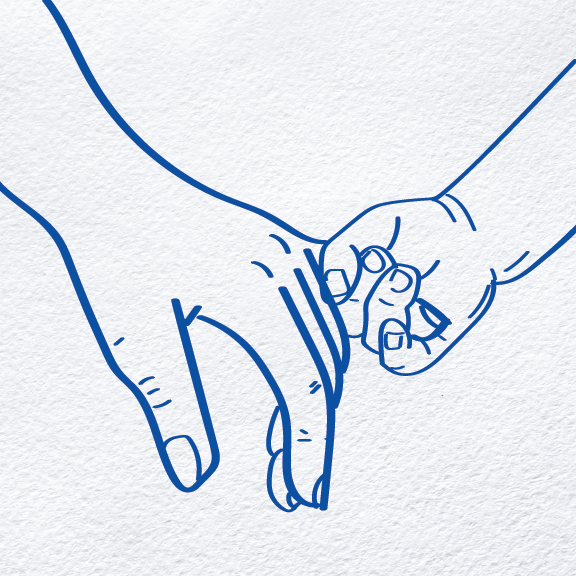How to Go On Living When Someone You Love Dies
Every person’s journey through grief is so unique, yet so similar. When we lose a remarkable person or pet in our lives, it can feel like everything is flipped upside down, and we’re left navigating this new world in a haze.
It’s like we enter a grief-loaded time warp. Time may seem to slow down, and getting through a day of what used to feel normal can feel like a drawn-out eternity. Other times, the days feel like they’re speeding by, and we wake up to realize months have passed in a blur. Finding an equilibrium during this chaotic time is difficult but not impossible. It does, however, require a conscious effort and daily work.
What is a New Normal?
By definition, normal is familiar, typical, or expected. But when we lose someone we love dearly, their absence in our lives can turn “normal” on its head.
How can we expect to go on with “normal” if our anchor in life is no longer with us?
When our normal routine is abruptly disrupted, we’re left with a choice. Either we try to hold on to the old normal, refusing to accept the changes thrust upon us, or we create a new one, as weird and scary as it may be to start.
In many ways, attempting to embrace a “new normal” can feel anything but “normal.” However, over time, as we learn to live with the grief and slowly invite joy and meaning back into our lives, we can use our new normal to honor and celebrate our loved one’s life.
We can’t rewind time to go back to life with our loved one or furry companion, but we can learn from what they taught us and celebrate their life and legacy every day moving forward.
Slowly, we can find rituals and routines that help us carry on our loved one’s legacy and honor their impact on our lives. And we can use every step forward as a way to celebrate their remarkable life.
After all, your loved one doesn’t have a choice in the matter, but you do. You can make a conscious choice to turn towards the pain, feel the feelings, find peace in letting go, and prioritize your self-care as you navigate this difficult chapter, honoring the life your loved one lived through the actions you take moving forward.
9 Ways to Go on Living When Someone You Love Passes Away
Allow Yourself to Feel
As you begin thinking about a new normal to honor and celebrate your loved one, keep in mind that a new normal may include taking time for yourself to feel all the complex emotions that come with grief. Be gentle with yourself as you express your feelings, no matter what they may be, and be sure to go at your own pace.
If you need some assistance in expressing your emotions, consider watching a sad movie or listening to Eterneva’s Feel Your Feels playlist to encourage the feelings to pour out.
And if you need an additional reason to feel it all, remember that there is real science behind it:
“Researchers have established that crying releases oxytocin and endogenous opioids, also known as endorphins. These feel-good chemicals help ease both physical and emotional pain.”
Leo Newhouse, Harvard Health
Find Peace in Letting Go
When someone we love passes, it’s common to want to hold on as tightly as possible. We want to hold on to the love we shared with them, the memories, their touch. And there’s absolutely nothing wrong with this.
Give yourself permission to honor their life. Finding peace in letting go of what “normal” once was so that you can find unique ways to carry on their legacy will open up possibilities that you may not yet know exist. They’re gone from this world, but you’re not. So rather than become immersed in the past, consider asking yourself, “How would they want me to live on without them?”
Prioritize Self-Care
Grief does a number on us. When we have a loved one that takes up a big part of our hearts, losing them can feel like we’re losing a piece of ourselves. Sometimes, loss can even feel like a heart attack or a panic attack.
Feeling it all can be exhausting. That’s why it’s essential to take some time to turn inward and focus on healing our broken hearts. Consciously prioritize self-care. The effects of grief can be overwhelming, so it’s critical that you schedule time on your calendar to love yourself, relax your body and mind, and seek peace.
Moving Forward with Intention
When we’re left reflecting on the life of someone remarkable who played a significant role in our world, it can be difficult to think about a future without them. But what if we don’t have to leave them behind? What if we include them in how we decide to move forward?
Set an intention. Write down the best qualities your loved one embodied. Then, choose one or two of these qualities to focus on in your own life. Reminding yourself daily of what made your loved one so special can help you carry their positivity and wonderful traits and put them out into the world, continuing their legacy.
Deep Breathing To Cure Anxiety
When we’re struggling with anxiety, our minds often search for answers. “Why?”... “Why did this happen?”... “Why am I alone?”... “What am I going to do?”
Unfortunately, this quest for logic and reason often leaves us with negative thoughts that can do more harm than good. So, next time you find yourself going down the “Why?” rabbit hole to understand your loved one’s passing, consider replacing this question with a deep inhale and exhale to calm your mind and body.
This way, you turn your quest for meaning into a feeling in your body.
“Allow yourself to stay unbiased and curious about what your body is experiencing before you make up any stories or meaning. A simple “Hmmmm” is a great place to start.” says Ingridy Helander, a licensed marriage and family therapist.
Tune Into Your Intuition
Whether you’re new to meditation or you’ve been meditating for years, setting aside some time daily to tune into your intuition, even if it’s just five minutes, can help ground you in the present moment and open you up to all of the beautiful opportunities life has to offer.
The more in touch we are with ourselves, the easier it is to connect with those around us from an authentic place. And cultivating these genuine connections can help inspire us to live fully, even when our grief is present.
Consider some guided meditations on a free app like InsightTimer to help encourage more time spent feeling your body and tuning into what your body, mind, and soul need in the present moment. And if you’re not quite ready to listen to words from someone else in a guided meditation, consider this sound therapy playlist.
Seek Positive Support
While your grief is extremely personal, remember that you do not have to go through this journey alone.
Reach out to close family or friends who will make you feel heard and understood. Or attend a local community yoga class or grief share group to speak with those who may be able to offer advice and insights. Support systems will look different for everyone, but it is important to seek connections where you feel comfortable expressing yourself.
Remember that seeking positive support can also include reducing or eliminating relationships in your life that are not positive and supportive. It is vital to surround yourself with those who can hold space, be gentle, and respect your feelings and boundaries.
While support can look like many different things in practice, the feeling you get from the support is what matters most. Are you around people who make you feel heard, less alone, or comforted? Great! If not, consider something different by going on a grief retreat or finding a grief therapist to help support you along your journey.
At first, positive support may be hard to accept. Give yourself some grace and start slowly. Maybe one phone call to a dear friend to start. Or a text to a supportive family member, letting them in on your journey. As you begin to open up, you can expand your circle.
Spend Time Connected
Often, when we experience loss, we have the urge to disconnect and hide in our metaphorical (or sometimes literal) caves. While spending time alone and reflecting can be positive, too much of anything can be harmful. So, the next time you feel isolated, add something to your schedule that helps you feel connected.
Connection can come in many forms. Maybe it’s with people, music, animals, plants, or nature. If you’re having a hard time thinking about what connection looks like to you, take some time to answer the following questions:
- What did my loved one and I enjoy doing together?
- Is there a way I can still do this in their honor?
- What makes me feel alive?
- What makes me feel in flow with the world around me?
- What did I enjoy doing as a child?
- Who do I enjoy spending my time with?
Keep a list of ideas to stay connected, and the next time you’re looking for a way to honor your loved one, or if you’re having a low day, turn to this list to find something that will help you not feel so alone.
Initiate New Rituals
The rituals we shared with our loved ones can be some of the things we miss the most. While it’s great if you want to continue these rituals, it’s also okay to initiate new habits that help you heal AND honor your loved one.
New rituals may not always feel easy at first, so remember to be gentle with yourself. If you choose to start a daily walk to honor your loved one, don’t be surprised if there are days you spend the walk crying your eyes out. It’s okay. Just remember to breathe through the discomfort of a new healthy ritual, and know that doing something for yourself is a way of celebrating their remarkable life.
If you want some ideas to try, consider these:
- Walk daily to connect with and maybe even talk to your loved one
- Cook a home-cooked meal once a week
- Go to their favorite park when you miss them
- Get outside at sunrise and/or sunset
- Cheers to their life as you drink a glass of water every morning
- Stop to smell the flowers on their behalf
- Set aside time to write down what you learn every week
- Write three things you’re grateful for every day
- Meditate every day
- Volunteer every week
- Grow and nurture a garden
- Commit to and spend time every week on a new hobby
- Write to your loved one on their birthday
- Buy yourself flowers or a special gift for your birthday
- Journal your progress every day, week, month, or year
As you try these new rituals, consider how they make you feel and keep the ones that work for you. Spend more time doing the things that feel right and honor your loved one and less on things that bring you down and make you feel isolated.
Remember, you’re not alone.
Sometimes, one step forward in your journey can feel like two steps back, and sometimes, we need to lean on others for support. Creating a new normal when you’ve lost someone you care about can be scary and intimidating, even impossible. But you can do it. Take things one day at a time, practice self-care, use your support system, and put one foot in front of the other.



.png)



.png)





